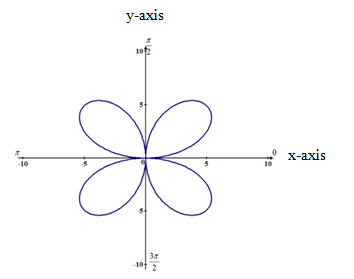
To calculate: To identify and graph the polar equation. Also to identify any symmetry and zeros of
Answer to Problem 37E
Type of polar equation is rose with four petals.
Polar equation is symmetric with respect to line
Zeros of polar equations are
Explanation of Solution
Given information: Polar equation is
Formula Used:
Cardioid: Heart shape curve and general form is
Limacons: General form of cardioid and general form is
When
When
When
When
Rose Curves: Sinusoidal curve that have a flower shape and general equation is
Archimedian Spirals: Curve that extends indefinitely outward from a pole and general form is
Lemniscate: Eight shaped curve and general form is
Test for Symmetry:
1. To test symmetry with respect to the line
2. To test symmetry with respect to the polar axis, replace
3. To test symmetry with respect to the pole, replace
Calculation:
Polar equation is given as follows:
Type of Polar Equation:
Polar equation is of form
Thus, graph of polar equation is a rose with four petals
Test Symmetric of Polar Equation:
To test Symmetry respect with respect to the line
Replacing
Since above equation is same as the given polar equation
Thus, polar equation is symmetric with respect to the line
To test Symmetry with respect to the polar axis
Replacing
Since above equation is NOT same as the given polar equation
Thus, polar equation is NOT symmetric with respect to the polar axis
To test Symmetry with respect to the pole
Replacing
Since above equation is NOT same as the given polar equation
Thus, polar equation is NOT symmetric with respect to the pole
Calculating Zeros of Polar Equation:
In order to calculate zeros of polar equation, substitute
Thus,
Graph of Polar Equation:
Graph of polar equation is as follows:

Conclusion:
Hence, type of polar equation is rose with four petals.
Polar equation is symmetric with respect to line
Zeros of polar equations are
Chapter 9 Solutions
PRECALCULUS W/LIMITS:GRAPH.APPROACH(HS)
- Find the accumulated amount A, if the principal P is invested at an interest rate of r per year for t years. (Round your answer to the nearest cent.) P = $3800, r = 4%, t = 10, compounded semiannually A = $ 5645.60 × Need Help? Read It SUBMIT ANSWER [3.33/6.66 Points] DETAILS MY NOTES REVIOUS ANSWERS ASK YOUR TEACHER TANAPCALC10 5.3.001.EP. PRACTICE ANOTHER Consider the following where the principal P is invested at an interest rate of r per year for t years. P = $3,100, r = 4%, t = 10, compounded semiannually Determine m, the number of conversion periods per year. 2 Find the accumulated amount A (in dollars). (Round your answer to the nearest cent.) A = $ 4604.44arrow_forwardForce with 800 N and 400 N are acting on a machine part at 30° and 60°, respectively with a positive x axis, Draw the diagram representing this situationarrow_forwardI forgot to mention to you to solve question 1 and 2. Can you solve it using all data that given in the pict i given and can you teach me about that.arrow_forward
 Calculus: Early TranscendentalsCalculusISBN:9781285741550Author:James StewartPublisher:Cengage Learning
Calculus: Early TranscendentalsCalculusISBN:9781285741550Author:James StewartPublisher:Cengage Learning Thomas' Calculus (14th Edition)CalculusISBN:9780134438986Author:Joel R. Hass, Christopher E. Heil, Maurice D. WeirPublisher:PEARSON
Thomas' Calculus (14th Edition)CalculusISBN:9780134438986Author:Joel R. Hass, Christopher E. Heil, Maurice D. WeirPublisher:PEARSON Calculus: Early Transcendentals (3rd Edition)CalculusISBN:9780134763644Author:William L. Briggs, Lyle Cochran, Bernard Gillett, Eric SchulzPublisher:PEARSON
Calculus: Early Transcendentals (3rd Edition)CalculusISBN:9780134763644Author:William L. Briggs, Lyle Cochran, Bernard Gillett, Eric SchulzPublisher:PEARSON Calculus: Early TranscendentalsCalculusISBN:9781319050740Author:Jon Rogawski, Colin Adams, Robert FranzosaPublisher:W. H. Freeman
Calculus: Early TranscendentalsCalculusISBN:9781319050740Author:Jon Rogawski, Colin Adams, Robert FranzosaPublisher:W. H. Freeman
 Calculus: Early Transcendental FunctionsCalculusISBN:9781337552516Author:Ron Larson, Bruce H. EdwardsPublisher:Cengage Learning
Calculus: Early Transcendental FunctionsCalculusISBN:9781337552516Author:Ron Larson, Bruce H. EdwardsPublisher:Cengage Learning





